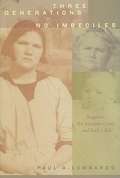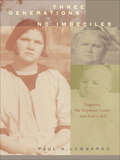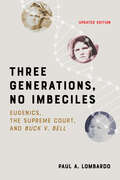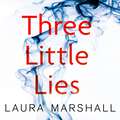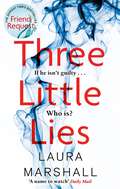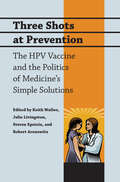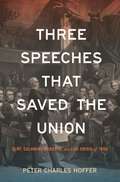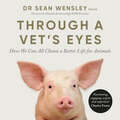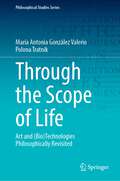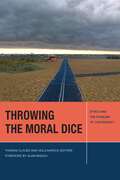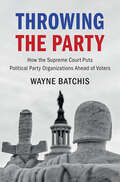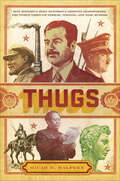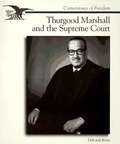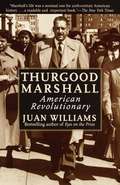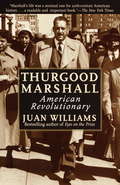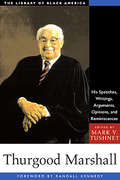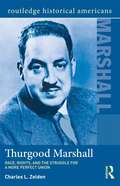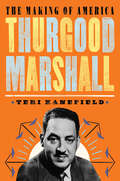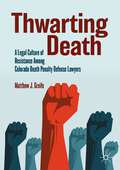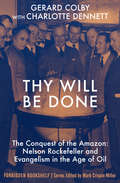- Table View
- List View
Three Generations, No Imbeciles: Eugenics, the Supreme Court, and Buck v. Bell
by Paul A. Lombardo"Three generations of imbeciles are enough." Few lines from Supreme Court opinions are as memorable as this declaration by Justice Oliver Wendell Holmes Jr. in the landmark 1927 case Buck v. Bell. The ruling allowed states to forcibly sterilize residents in order to prevent "feebleminded and socially inadequate" people from having children. It is the only time the Supreme Court endorsed surgery as a tool of government policy. Paul Lombardo's startling narrative exposes the Buck case's fraudulent roots. In 1924 Carrie Buck -- involuntarily institutionalized by the State of Virginia after she was raped and impregnated -- challenged the state's plan to sterilize her. Having already judged her mother and daughter mentally deficient, Virginia wanted to make Buck the first person sterilized under a new law designed to prevent hereditarily "defective" people from reproducing. Lombardo's more than twenty-five years of research and his own interview with Buck before she died demonstrate conclusively that she was destined to lose the case before it had even begun. Neither Carrie Buck nor her mother and daughter were the "imbeciles" condemned in the Holmes opinion. Her lawyer -- a founder of the institution where she was held -- never challenged Virginia's arguments and called no witnesses on Buck's behalf. And judges who heard her case, from state courts up to the U.S. Supreme Court, sympathized with the eugenics movement. Virginia had Carrie Buck sterilized shortly after the 1927 decision. Though Buck set the stage for more than sixty thousand involuntary sterilizations in the United States and was cited at the Nuremberg trials in defense of Nazi sterilization experiments, it has never been overturned. Three Generations, No Imbeciles tracks the notorious case through its history, revealing that it remains a potent symbol of government control of reproduction and a troubling precedent for the human genome era.
Three Generations, No Imbeciles: Eugenics, the Supreme Court, and Buck v. Bell
by Paul A. LombardoWinner, 2009 Georgia Author of the Year Award for Creative Nonfiction HistoryHonorable Mention, Nonfiction. Library of Virginia Literary Awards"Three generations of imbeciles are enough." Few lines from Supreme Court opinions are as memorable as this declaration by Justice Oliver Wendell Holmes Jr. in the landmark 1927 case Buck v. Bell. The ruling allowed states to forcibly sterilize residents in order to prevent "feebleminded and socially inadequate" people from having children. It is the only time the Supreme Court endorsed surgery as a tool of government policy. Paul Lombardo’s startling narrative exposes the Buck case’s fraudulent roots.In 1924 Carrie Buck—involuntarily institutionalized by the State of Virginia after she was raped and impregnated—challenged the state’s plan to sterilize her. Having already judged her mother and daughter mentally deficient, Virginia wanted to make Buck the first person sterilized under a new law designed to prevent hereditarily "defective" people from reproducing. Lombardo’s more than twenty-five years of research and his own interview with Buck before she died demonstrate conclusively that she was destined to lose the case before it had even begun. Neither Carrie Buck nor her mother and daughter were the "imbeciles" condemned in the Holmes opinion. Her lawyer—a founder of the institution where she was held—never challenged Virginia’s arguments and called no witnesses on Buck’s behalf. And judges who heard her case, from state courts up to the U.S. Supreme Court, sympathized with the eugenics movement. Virginia had Carrie Buck sterilized shortly after the 1927 decision.Though Buck set the stage for more than sixty thousand involuntary sterilizations in the United States and was cited at the Nuremberg trials in defense of Nazi sterilization experiments, it has never been overturned. Three Generations, No Imbeciles tracks the notorious case through its history, revealing that it remains a potent symbol of government control of reproduction and a troubling precedent for the human genome era.
Three Generations, No Imbeciles: Eugenics, the Supreme Court, and Buck v. Bell
by Paul A. LombardoThis updated edition includes a new afterword that identifies the role the Buck story plays in the Supreme Court's review of emerging state laws that seek to limit access to abortion."Three generations of imbeciles are enough." Few lines from U.S. Supreme Court opinions are as memorable as this declaration by Justice Oliver Wendell Holmes Jr. in the landmark 1927 case Buck v. Bell. The ruling allowed states to forcibly sterilize residents in order to prevent "feebleminded and socially inadequate" people from having children. It is the only time the Supreme Court endorsed surgery as a tool of government policy. Though Buck set the stage for more than sixty thousand involuntary sterilizations in the United States and was cited at the Nuremberg trials in defense of Nazi sterilization experiments, it has never been overturned. It has been more than a decade since Paul A. Lombardo's classic Three Generations, No Imbeciles first exposed the Buck case's fraudulent roots. During that time, several of the remaining twentieth-century eugenic sterilization statutes have finally been repealed, and reparations to sterilization survivors have been paid in two states. Discussion of the Buck case has once again engendered controversy in the courts. The Wisconsin Supreme Court invoked Buck most recently in a debate over the power of the state to enact restrictions on citizens and businesses during the COVID-19 crisis, and the US Supreme Court cited Three Generations, No Imbeciles in arguments over the newest state laws seeking to limit access to abortion. This updated edition collects and analyzes information related to events and trends discussed in the earlier volume and includes a completely new afterword, "Looking Back at Buck," that explains how the case remains a key feature of public discourse about disability, government power, and reproductive rights. It also presents restored copies of the letters of Carrie Buck and points readers to an online archive of legal documents, images, and other material relevant to the case. The book remains a key resource for law school faculties, legal and medical historians, and anyone with an interest in the history of reproduction in the United States."Startling."—Reason"Compelling and well-researched... Three Generations, No Imbeciles gives Carrie Buck's long-untold story the attention it deserves."—Harvard Law Review"Three Generations provides valuable, new, and timely revelations for students and professional scholars across many disciplines."—Disability Studies Quarterly"Meticulously detailed and researched history... this book is enjoyable, thought provoking, and troubling in equal measure. I highly recommend it."—Psychiatric Services
Three Little Lies: A completely gripping thriller with a killer twist
by Laura Marshall'A name to watch in the world of twisty, gripping thrillers . . . It rings as true as tomorrow's headlines' Daily MailThe addictive new thriller from the Sunday Times bestselling author of FRIEND REQUEST.*****Sasha North has gone missing. Everyone says she's run away, but I know better. We've been best friends since we were teenagers, since Sasha swept into the neighbourhood and brought colour to my life. Until a brutal attack changed both our lives forever.I know what happened that night. I know who wants revenge.And if Sasha has been taken, does that mean I'm next? *****What people are saying about THREE LITTLE LIES:'Compulsive' Rachel Abbott'Superb' Sun 'An addictive, expertly-plotted thriller with a great twist - if you liked FRIEND REQUEST, you'll love this' T. M. Logan'Brilliant' Fiona Cummins'Tense and full of surprises - I have a good feeling Laura Marshall is here to stay!' Emily Elgar'Addictive' Caz Frear'If you loved FRIEND REQUEST, you'll devour THREE LITTLE LIES. You won't know who to believe and you won't be able to put it down until you get to the (shocking) truth. Great stuff!' CJ Tudor'A compulsive psychological thriller with compelling characters and a twisty plot' Jenny Quintana'I raced through this, genuinely unable to put it down. Another brilliant, compelling novel' Karen Hamilton'A realistic coming-of-age tale that drew me in, Laura's masterful plot and ability to interweave past and present so skilful I was completely blind-sided by the brilliant final twist' Amanda Reynolds'Couldn't put THREE LITTLE LIES down . . . a taut, absorbing and hugely addictive thriller' Chris Whitaker
Three Little Lies: A completely gripping thriller with a killer twist
by Laura MarshallIf he isn't guilty . . . Who is? 'Addictive' Caz Frear'Brilliant, compelling' Karen Hamilton'Compulsive' Rachel Abbott Don't miss Laura Marshall's next utterly addictive thriller - THE ANNIVERSARY is available to pre-order now. ___________Sasha North has gone missing. Everyone says she's run away, but I know better. We've been best friends since we were teenagers, since Sasha swept into the neighbourhood and brought colour to my life. Until a brutal attack changed both our lives forever.I know what happened that night. I know who wants revenge.And if Sasha has been taken, does that mean I'm next? The captivating new psychological thriller by Laura Marshall, Sunday Times bestselling author of FRIEND REQUEST. *******'A name to watch in the world of twisty, gripping thrillers' DAILY MAIL'An addictive, expertly-plotted thriller with a great twist' T. M. Logan, author of THE HOLIDAY'Superb' SUN'Tense and full of surprises' Emily Elgar, author of IF YOU KNEW HER'If you loved FRIEND REQUEST, you'll devour THREE LITTLE LIES' C. J. Tudor, author of THE CHALK MAN'A compulsive psychological thriller' Jenny Quintana, author of THE MISSING GIRL 'Another brilliant, compelling novel' Karen Hamilton, author of THE PERFECT GIRLFRIEND'Brilliant' Fiona Cummins, author of THE NEIGHBOUR'Masterful' Amanda Reynolds, author of LYING TO YOU 'Taut, absorbing and hugely addictive thriller' Chris Whitaker, author of WE BEGIN AT THE END
Three Shots at Prevention: The HPV Vaccine and the Politics of Medicine's Simple Solutions
by Steven Epstein Julie Livingston Robert Aronowitz Keith WailooIn 2007, Texas governor Rick Perry issued an executive order requiring that all females entering sixth grade be vaccinated against the human papillomavirus (HPV), igniting national debate that echoed arguments heard across the globe over public policy, sexual health, and the politics of vaccination. Three Shots at Prevention explores the contentious disputes surrounding the controversial vaccine intended to protect against HPV, the most common sexually transmitted infection. When the HPV vaccine first came to the market in 2006, religious conservatives decried the government's approval of the vaccine as implicitly sanctioning teen sex and encouraging promiscuity while advocates applauded its potential to prevent 4,000 cervical cancer deaths in the United States each year. Families worried that laws requiring vaccination reached too far into their private lives. Public health officials wrestled with concerns over whether the drug was too new to be required and whether opposition to it could endanger support for other, widely accepted vaccinations. Many people questioned the aggressive marketing campaigns of the vaccine's creator, Merck & Co. And, since HPV causes cancers of the cervix, vulva, vagina, penis, and anus, why was the vaccine recommended only for females? What did this reveal about gender and sexual politics in the United States? With hundreds of thousands of HPV-related cancer deaths worldwide, how did similar national debates in Europe and the developing world shape the global possibilities of cancer prevention?This volume provides insight into the deep moral, ethical, and scientific questions that must be addressed when sexual and social politics confront public health initiatives in the United States and around the world.
Three Speeches that Saved the Union: Clay, Calhoun, Webster, and the Crisis of 1850
by Peter Charles HofferHow three skilled orators navigated a polarized political landscapeFor the generation of politicians who inherited the Republic and the Union, the opening months of 1850 were a desperate time filled with increasing animosity between free and slave state leaders over issues of the expansion of slavery. Following the end of the Mexican-American War and the subsequent expansion of American territory came a series of fiery debates over how this new territory would be governed, and whether to allow California’s admission to the Union as a “free state.” Three Speeches That Saved the Union provides the first ever deep content analysis of the three most eventful speeches delivered in the Us Senate. Historian Peter Charles Hoffer offers a thorough analytical study of the roles of the "great triumvirate" of American political leaders – Henry Clay, John C. Calhoun and Daniel Webster – played in preserving the American Union. All three were lawyers, and for lawyers especially, words mattered. As is the case today, practicing law meant knowing and using “terms of art” correctly, and knowing which words would sway a jury – or a nation. Despite their opposing viewpoints, these skilled orators urged for some kind of compromise that would diffuse the possibility of civil war. Providing all three speeches in their entirety, alongside a running commentary framing the political climate and manner in which each of these speeches were delivered, Hoffer demonstrates how intractable the slavery issue had become, how near a civil war was, and how it was prevented – at least for a time. Three Speeches That Saved the Union is an invaluable study of a nation that three speeches pulled from the brink of dissolution.
Through A Vet’s Eyes: How we can all choose a better life for animals
by Dr Dr Sean Wensley FRCVS'A compelling account of the trials, tribulations and triumphs of life as a vet - and a lesson to us all on how we should treat the animals with which we share our lives.' - Stephen Moss, naturalist and authorDr Sean Wensley is an award-winning vet and lifelong naturalist who has contributed to animal welfare and conservation projects all over the world. His debut book is about how we can choose a better life for animals, from the chickens we eat to the pets we keep.As our societies become more urbanised, we are further removed from the reality of where and how our food is produced. Surveys suggest that nearly 1 in 4 UK adults don't know that bacon comes from pigs. On the opposite end of the spectrum, the humanisation of our pets is a risk to their welfare; with over 60% of UK dogs being overweight or obese, we are effectively killing them with kindness. Through A Vet's Eyes seeks to redress this imbalance so that we see all animals as thinking, feeling beings not dissimilar to ourselves. As he takes us through the years in which he trained to become a vet, and set against a backdrop of inspiring natural spectacles, Dr Wensley shares his first-hand experience of how animals are treated and used for our benefit. He interrogates the different levels of welfare afforded to them and reveals how we the general consumer can reduce our animal welfare footprint through the choices we make every day.
Through A Vet’s Eyes: How we can all choose a better life for animals
by Dr Sean Wensley FRCVSOne of the Financial Times' Best Summer Books of 2022 A vet's eye-opening polemic about our relationship with animals; how we treat them, what it feels like from their perspective, how we get it wrong and what we can do to fix it.Dr Sean Wensley is an award-winning vet and lifelong naturalist who has contributed to animal welfare and conservation projects all over the world. His debut book is about how we can choose a better life for animals, from the chickens we eat to the pets we keep.As our societies become more urbanised, we are further removed from the reality of where and how our food is produced. Reported surveys have suggested that 1 in 4 UK adults don't know that bacon comes from pigs. On the opposite end of the spectrum, the humanisation of our pets is a risk to their welfare; with over 60% of UK dogs being overweight or obese, we are effectively killing them with kindness. Through A Vet's Eyes seeks to redress this imbalance so that we see all animals as thinking, feeling beings not dissimilar to ourselves. As he takes us through the years in which he trained to become a vet, and set against a backdrop of inspiring natural spectacles, Dr Wensley shares his first-hand experience of how animals are treated and used for our benefit. He interrogates the different levels of welfare afforded to them and reveals how we the general consumer can reduce our animal welfare footprint through the choices we make every day.(P) Octopus Publishing Group 2022
Through the Gates of Hell: American Injustice at Guantanamo Bay
by Joshua Colangelo-BryanAn inspiring true story about an American attorney and his client confronting prejudice and persecution in a prison outside the law, as one fights for the other&’s freedom, and the other fights for his life.&“We&’ll be watching,&” the sergeant said, pointing at a video monitor inside Camp Echo&’s guard booth. &“For your protection.&” In 2004, attorney Joshua Colangelo-Bryan arrived at Guantanamo Bay to meet Jaber Mohammed, one of six Bahraini detainees his firm had agreed to represent. Colangelo-Bryan had heard these men were &“among the most dangerous, best-trained, vicious killers on the face of the earth,&” as Secretary of Defense Donald Rumsfeld put it. Colangelo-Bryan didn&’t buy the rhetoric, but did find himself wondering if he was about to meet a killer. Far from being threatening, though, Mohammed welcomed Colangelo-Bryan, even as his ankle was shackled to the floor. Why was Mohammed there? Was he guilty of a crime? These were among the questions Colangelo-Bryan had to answer. Surprisingly, the two spoke for hours about their lives. Mohammed also detailed the inhumane conditions at the prison, including abuse by guards and solitary confinement. A friendship grew over time, as Colangelo-Bryan worked to bring justice to Mohammed. The Bush administration claimed any &“enemy combatant&” could be held in Guantanamo forever without a trial, and it became clear that litigation was unlikely to free the Bahrainis. And so, as Mohammed lost hope, Colangelo-Bryan devised a plan to leverage the media and pressure the Bahraini government to negotiate for the release of its citizens. Colangelo- Bryan&’s long fight for the Bahrainis was ultimately successful, and in 2007, after several suicide attempts, Mohammed was freed. Through the Gates of Hell is a powerful account of an unlikely friendship and what it takes to fight for human rights in the post–9/11 era.
Through the Scope of Life: Art and (Bio)Technologies Philosophically Revisited (Philosophical Studies Series #153)
by Polona Tratnik María Antonia González ValerioThis book offers intriguing philosophical inquiries into biotechnological art and the life sciences, addressing their convergences as well as their epistemic and functional divergences. Rooted on a thorough understanding of the history of philosophy, this work builds on critical and ontological thought to interpret the concept of life that underscores first-hand dealings with matter and experimentation. The book breaks new ground on the issue of animality and delivers fresh posthumanist perspectives on the topics addressed. The authors embark on a deep ontological probe of the concept of medium as communication-bridging and life-bearing. They also take on the concept of performativity as biotechnological art.The book includes concrete, well-documented case studies and shows how certain narratives and practices directly impact ideas surrounding science and technologies. It will interest philosophers in art and technology, aesthetics, ontology, and the life sciences. It will also engage art practitioners in art and science, curators and researchers.
Throwing the Moral Dice: Ethics and the Problem of Contingency (Just Ideas)
by Thomas Claviez and Viola MarchiMore than a purely philosophical problem, straddling the ambivalent terrain between necessity and impossibility, contingency has become the very horizon of everyday life. Often used as a synonym for the precariousness of working conditions under neoliberalism, for the unknown threats posed by terrorism, or for the uncertain future of the planet itself, contingency needs to be calculated and controlled in the name of the protection of life. The overcoming of contingency is not only called upon to justify questionable mechanisms of political control; it serves as a central legitimating factor for Enlightenment itself. In this volume, nine major philosophers and theorists address a range of questions around contingency and moral philosophy. How can we rethink contingency in its creative aspects, outside the dominant rhetoric of risk and dangerous exposure? What is the status of contingency—as the unnecessary and law-defying—in or for ethics? What would an alternative “ethics of contingency”—one that does not simply attempt to sublate it out of existence—look like?The volume tackles the problem contingency has always posed to both ethical theory and dialectics: that of difference itself, in the difficult mediation between the particular and the universal, same and other, the contingent singularity of the event and the necessary generality of the norms and laws.From deconstruction to feminism to ecological thought, some of today’s most influential thinkers reshape many of the most debated concepts in moral philosophy: difference, agency, community, and life itself.Contributors: Étienne Balibar, Rosi Braidotti, Thomas Claviez, Drucilla Cornell, Hans Ulrich Gumbrecht, Viola Marchi, Michael Naas, Cary Wolfe, Slavoj Žižek
Throwing the Party: How the Supreme Court Puts Political Party Organizations Ahead of Voters (Cambridge Studies on Civil Rights and Civil Liberties)
by Wayne BatchisThe Supreme Court's jurisprudence on political parties is rooted in an incomplete story. Parties are, like voluntary clubs, associations of individuals that are represented by a singular organization. However, as political science has long understood, they are much more than this. Parties are also the voters who choose and support their candidates, the elected officials who govern, the activists and volunteers who contribute their time and energy, and the individual and organizational donors who open their wallets. Unfortunately, the Court's framework for understanding America's two-party system has largely ignored this broader conception of political parties. The result has been a distortion of the true nature of the two-party system, and a body of deeply inconsistent and contradictory constitutional case law. From primaries to campaign finance, partisan gerrymandering to ballot access, law and politics scholar Wayne Batchis interrogates, scrutinizes, and offers a proposed solution to this problematic jurisprudence.
Thugs: How History's Most Notorious Despots Transformed the World through Terror, Tyranny, and Mass Murder
by Micah D. HalpernAn incisive look into the lives, politics, and horrible deeds of fifty-six of history’s most notorious world leaders—and how they shaped our world for the worst.For the most notorious leaders in the history of the world, evil is more than just a moment of weakness—it’s a way of life.For every noble king, righteous emperor, and peace-loving president, history seems to serve up a double portion of murderous pharaohs, deranged dictators, or corrupt czars. Thugs probes this dark and twisted side of raw human power—from France’s King Louis XIV to China’s Mao Tse-Tung and everywhere in between. It’s a fascinating peek into the lives of the rich and infamous, the sour crème de la crème.Some, like Herod the Great, earned villainous reputations for slaughtering their own family members and countrymen. Others, like Egypt’s King Farouk, were almost laughable in their misdeeds, amassing the world’s largest collection of pornography. Then there are those leaders, such as Hitler, who committed acts of such unspeakable evil that their names are uttered as curses.From Filipino first lady Imelda Marcos’s bullet-proof bras to African strongman Ide Amin’s bizarre fixation with all things Scottish, Micah D. Halpern turns the yellowed pages of history and contemporary news accounts to profile the bewildering, outrageous, horrific, gut-wrenching, zany, and tragicomic behavior of the world’s worst leaders.Praise for Thugs“Written in short, easy-to-digest sentences, columnist and historian Halpern fills his brief sketches with colorful, terrible details in the manner of that rare, beloved history teacher whose lectures stir rapture in a nap-prone student body.” —Publishers Weekly
Thurgood Marshall and the Supreme Court (Cornerstones of Freedom)
by Deborah KentNarrates the life of the first African-American to serve as a judge on the United States Supreme Court.
Thurgood Marshall, Supreme Court Justice
by Garnet N. JacksonExamines the life of the first black man to be appointed an associate justice of the highest court in the country.
Thurgood Marshall: American Revolutionary
by Juan WilliamsThis biography covers Thurgood Marshall's life from birth to death, the influence on his life and thinking by family and friends, and presents a picture of both his strengths and weaknesses.
Thurgood Marshall: Civil Rights Attorney and Supreme Court Justice
by Mark RowhTraces the life, accomplishments, and legacy of the civil rights attorney who became a prominent Supreme Court Justice.
Thurgood Marshall: Freedom's Defender
by Juan WilliamsThis New York Times Notable Book of the Year, 1998, is now in trade paper. From the bestselling author of Eyes on the Prize, here is the definitive biography of the great lawyer and Supreme Court justice.
Thurgood Marshall: His Speeches, Writings, Arguments, Opinions, and Reminiscences (The Library of Black America series)
by Randall Kennedy Mark V. TushnetMuch has been written about Thurgood Marshall, but this is the first book to collect his own words. Here are briefs he filed as a lawyer, oral arguments for the landmark school desegregation cases, investigative reports on race riots and racism in the Army, speeches and articles outlining the history of civil rights and criticizing the actions of more conservative jurists, Supreme Court opinions now widely cited in Constitutional law, a long and complete oral autobiography, and much more. Marshall's impact on American race relations was greater than that of anyone else this century, for it was he who ended legal segregation in the United States. His victories as a lawyer for the NAACP broke the color line in housing, transportation, voting, and schools by overturning the long-established "separate-but-equal" doctrine. But Marshall was attentive to all social inequalities: no Supreme Court justice has ever been more consistent in support of freedom of expression, affirmative action, women's rights, abortion rights, and the right to consensual sex among adults; no justice has ever fought so hard against economic inequality, police brutality, and capital punishment.
Thurgood Marshall: Race, Rights, and the Struggle for a More Perfect Union
by Charles L. ZeldenThurgood Marshall was an Associate Justice of the US Supreme Court from 1967 to 1991. He was the first African American to hold that position, and was one of the most influential legal actors of his time. Before being appointed to the Supreme Court by President Lyndon Johnson, Marshall was a lawyer for the National Association for the Advancement of Colored People (NAACP), Federal Judge (1961-1965), and Solicitor General of the United States (1965-1966). Marshall won twenty-nine of thirty-two cases before the Supreme Court – most notably the landmark case of Brown v. Board of Education, which held segregated public schools unconstitutional. Marshall spent his career fighting racial segregation and legal inequality, and his time on the court establishing a record for supporting the "voiceless American." He left a legacy of change that still affects American society today. Through this concise biography, accompanied by primary sources that present Marshall in his own words, students will learn what Marshall did (and did not do) during his life, why those actions were important, and what effects his efforts had on the larger course of American history.
Thurgood Marshall: The Making Of America #6 (The Making of America)
by Teri KanefieldThis biography for young readers examines the life of a brilliant lawyer who successfully argued the case that ended legal racial segregation in America.Thurgood Marshall, the great grandson of a slave, was born at a time when African Americans were denied equal rights in America. Segregation was legal. Lynching was common. In some places, African Americans were entirely excluded from public life; they were forbidden to enter public parks and museums or use public swimming pools and restrooms.After being denied admission to the University of Maryland Law School because of his race, Marshall enrolled at Howard University. He graduated first in his class and set out as a young lawyer determined to achieve equality for all Americans. Here is the story of how he did it—how he devised his legal strategy for expanding “we the people” to include all people.Thurgood Marshall explores the life of the brilliant lawyer who successfully argued the case that ended legal racial segregation in America, following his childhood in Baltimore to his trailblazing career as a civil rights lawyer, and finally his years as a United States Supreme Court justice.This book includes a timeline, excerpts of Marshall’s writings, source notes, a bibliography, and an index.“Provides a well-rounded look not only at the life of Marshall, but at the events in the world that shaped him into the man he was, and how he in turn helped shape the world for future generations.” —School Library Connection
Thurman Arnold: A Biography
by Spencer Weber WallerThurman Arnold (1891-1969) was a major iconoclast of American law and a great liberal of the 20th century. In this first biography of Arnold, Spencer Weber Waller traces Arnold's life from his birth in Laramie, Wyoming, and explores how his western upbringing influenced his distinctive views about law and power. After studying at Princeton and Harvard Law School, Arnold practiced law in Chicago, served in World War I, and eventually returned to Laramie, where he was a prominent practitioner, mayor, and state legislator in the 1920s.As the rise of national corporations began to destroy the local businesses that were the core of his legal practice, Arnold turned from the courtroom to the academy, most notably at Yale Law School, where he became one of the leading spokesmen for the legal realism movement. Arnold’s work attracted the attention of Franklin Roosevelt, who appointed him to head the Antitrust Division during the New Deal. He went on to establish Arnold, Fortas & Porter, which became the epitome of the modern Washington, DC law firm, and defended pro-bono hundreds of clients accused of Communist sympathies during the McCarthy era.One of the few individuals who shaped 20th century American law in so many of its facets, Arnold's biography is long overdue, and Waller honors his life and legacy with a book that is both vividly narrated and extensively researched.
Thwarting Death: A Legal Culture of Resistance Among Colorado Death Penalty Defense Lawyers
by Matthew J. GreifeThis book examines the lived experienes of death penalty defense lawyers and how they created a legal culture of resistance to the death penalty. It argues that an important social component of death penalty abolition in the state of Colorado was due to the efforts of capital defense attorneys. Specifically, it explores how the death penalty defense lawyers created and embraced a legal culture of resistance which compelled the attorneys to fight tenaciously in order to win life sentences for clients that had committed brutal homicides. A legal culture of resistance does not exist in a vacuum. Thwarting Death traces the lived experience of 15 death penalty defense lawyers from when they were kids all the way up through retirement to explain how a legal culture of resistance forms and lawyers operate within it after being established which in turn can have a massive influence on public policy outside of a courtroom; such as creating a social and political environment conducive to abolishing the death penalty.
Thy Will Be Done: The Conquest of the Amazon: Nelson Rockefeller and Evangelism in the Age of Oil (Forbidden Bookshelf #25)
by Charlotte Dennett Gerard ColbyA &“blistering exposé&” of the USA&’s secret history of financial, political, and cultural exploitation of Latin America in the 20th century, with a new introduction (Publishers Weekly). What happened when a wealthy industrialist and a visionary evangelist unleashed forces that joined to subjugate an entire continent? Historians Gerard Colby and Charlotte Dennett tell the story of the forty-year campaign led by Standard Oil scion Nelson Rockefeller and Wycliffe Bible Translators founder William Cameron Townsend to establish a US imperial beachhead in Central and South America. Beginning in the 1940s, future Vice President Rockefeller worked with the CIA and allies in the banking industry to prop up repressive governments, devastate the Amazon rain forest, and destabilize local economies—all in the name of anti-Communism. Meanwhile, Townsend and his army of missionaries sought to undermine the belief systems of the region&’s indigenous peoples and convert them to Christianity. Their combined efforts would have tragic and long-lasting repercussions, argue the authors of this &“well-documented&” (Los Angeles Times) book—the product of eighteen years of research—which legendary progressive historian Howard Zinn called &“an extraordinary piece of investigative history. Its message is powerful, its data overwhelming and impressive.&”
